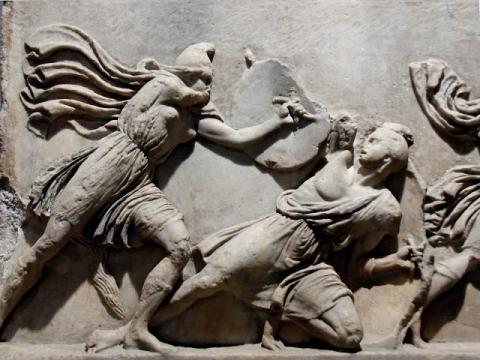Ayelet Haimson Lushkov and Nadya Williams
April 18, 2018
A Day in the Life of A Classicist is a monthly column on the SCS blog, celebrating the working lives of classicists.
Nadya Williams is Associate Professor of History at the University of West Georgia.
As an academic who is also a homeschooling mom, crazy is the normal for me. I am married to another academic, and thus we set our schedule together. To make sure that we have at least some time together as a family, we start the day with a family breakfast around 8 am. By 9 am, the 12-year-old starts his homeschooling day (he has a list of assignments to work through, and I check as needed), and I start the work day. Sometimes the toddler gets out his toy computer, and starts pounding on it in imitation of mama typing. Solidarity!
There are several factors that make it possible for me to be productive at work, while also giving a lot of time and attention to my children. First, my husband is incredible. Second, there is significant demand for online courses at my university, and I enjoy the process of teaching online, although it results in a lot more work for me, and demands a lot of more my time than if I were just to walk into the classroom twice a week for an hour and a half! Finally, my work responsibilities these days involve a reduced teaching load, because I also do some administrative work. This allows me to work mostly from home. My service responsibilities rival teaching duties, as far as time commitments go.
I am usually online the entire morning for my online/phone office hours, and as much as possible, I try to reserve this time for my class responsibilities. But if there is time, I may also respond to some other work emails that are not related to class. Finally, I may run a load or two of laundry in the background as well. Now that the toddler only wants to wear the same pair of dinosaur sweatpants every day, laundry has become a more pressing task.
On three out of five days, at noon I drop off the 12-year-old for an afternoon class or activity (he takes a couple of classes at nearby homeschool co-op). At this point, the toddler takes a glorious nap. This is my time to write if I have a lot of ideas in my head that day, but also this is the time to work on any other work tasks that require my undivided attention.
I often have various committee meetings in the late afternoon. My husband and I have a perfectly choreographed routine for the kid swap: I pull up to the building where my office is located and jump out as he jumps in. On the one day during the week when the 12-year-old does not have other structured afternoon activities, and if I do not have any work meetings, we have informal study group with another homeschooling family who have become dear friends. The 12-year-old works on homework (and plays) with his friend, while I get to read Caesar with the high-schooler in that family. It is truly wonderful – every Classicist should have a Caesar-reading high-school friend! Some semesters I have also had office hours at a local coffee shop one afternoon a week. This semester’s schedule got too crazy for this, but I am planning to bring it back in the fall, as students have been telling me how much they miss it.

"Dinosaurs and coffee cup," Nadejda Williams, unpublished
Once a week most semesters, I teach an evening seminar. This semester it is an Honors World Civ. seminar, and it has been fabulous. It is like a book club, but what makes it especially fun for me is that I got to select all the books. So, I get to spread my love of the Athenian democracy, Mary Beard, and Apuleius to wonderfully thoughtful students, who take turns leading discussion. If it is my evening seminar night, I meet with any students who want to talk to me after class, and get home around 9:30 pm. On other evenings, I make dinner and the family has dinner together, and then we do bedtime routines. The toddler is in bed by 8:00 pm, while the 12-year-old is in bed by 9:00 pm. Either way, I usually check email and try to respond to everything that rolled in over the afternoon and evening.
These days, I generally end up getting my best writing done at home during the toddler’s glorious naps. Night-time can be productive as well. My desk shows the (im)perfect harmony of my many roles as mom, wife, and Classicist, but the main “desk” that I use is the dining room table! The kids love that they can join me and do their own work as well sometimes. As I am typing this, the toddler is at the other end of the table, eating a snack.
I have a small army of amazing babysitters who can watch the kids on meeting days, which are most often Fridays. I do feel too guilty, however, to get a babysitter just so I can write or grade, for instance. So when I have a big pile of grading or a writing deadline, I normally end up doing it late at night and/or on the weekends. Saturdays are often grading days. And this present writing is happening during Spring Break, the early part of which I spent grading really good papers on Quintus Cicero’s pamphlet on electioneering.
One thing that organically happened as a result of having kids and also teaching more online is that work seeps into life, and life seeps into work. I think this has made me a better teacher and a better parent. There is a reasonable degree of work-life balance for the most part, but whenever there is not, my husband is skilled at calling me back to reality, and encouraging me to take an evening off. But when he has a deadline, we might both keep working until late in the evening, although we will try to do so together in the same room. The epitome of nerdy romance.
A friend recently joked that she thought all historians were “Scottish men in tweed.” She knows that I am an ancient historian, but presumably thinks I am an anomaly, rather than the norm. That is an unfortunate stereotype from the past, which continues to do harm to the perception of our field (with all due respect to Scottish and other men in tweed). I wish people outside the field knew that Classicists (and academics) these days are not all white men, and are not all research faculty. We all love our field deeply and passionately, and we all have a desire to share our love for it with others. Our audiences may vary, however, depending on where we are in our particular life stage, type of institution, personal calling, etc. Each of us has different gifts, and as long as we are using them for the benefit of others (whether the students, the profession, the broader public, or to some extent all of the above), we should just celebrate this diversity of talents, rather than trying to define academic success in one narrow way.

Header Images: Amazonomachy scene: An Amazon woman warrior (left) doing battle with a Greek on a frieze (decorative band that runs the length of a building's wall). Panel from the Halicarnassus Mausoleum and now at the British Museum. Image credit: Wikipedia.
Authors



